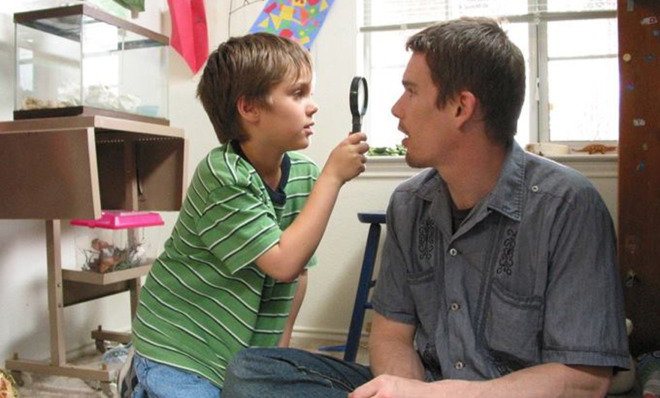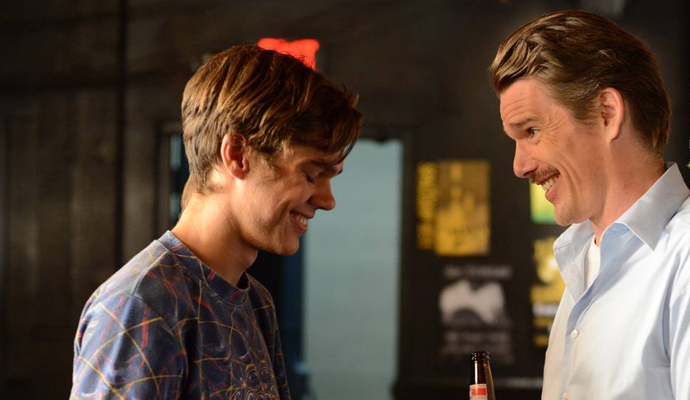Boyhood is the culmination of Richard Linklater's fascinating, career-long obsession with time
"You process your life by hours, days, minutes. As humans, we find patterns and impose it on our reality."

A free daily email with the biggest news stories of the day – and the best features from TheWeek.com
You are now subscribed
Your newsletter sign-up was successful
Boyhood, the new film from Richard Linklater, is about one boy's evolution to young adulthood. The film follows Mason Jr., played by Ellar Coltrane, and his family as they grow and change over the course of 12 years. But the real star of the movie is time itself; shot in installments over those 12 years, Boyhood captures Coltrane's actual development into a man, a feat of cinematic realism that has earned the film a 99 percent rating on Rotten Tomatoes.
Time is a subject that Linklater is all too familiar with, and his fascination can be traced from the very beginning of his 30-year career. In that sense, Boyhood is more than just a movie that look a long time to make — it's a culmination of Linklater's body of work.
I recently spoke with Linklater, who told me that he's "always trying to capture the perception of going through life" in his movies, "or the way moments pass, or the way we perceive the world, where our mind works. That's some area I've always related to storytelling, and what I was trying to capture."
The Week
Escape your echo chamber. Get the facts behind the news, plus analysis from multiple perspectives.

Sign up for The Week's Free Newsletters
From our morning news briefing to a weekly Good News Newsletter, get the best of The Week delivered directly to your inbox.
From our morning news briefing to a weekly Good News Newsletter, get the best of The Week delivered directly to your inbox.
Boyhood acts as a kind of Rosetta Stone to his career. What else but time — as both narrative device and a source of inspiration — can connect the '70s stoner-teen pastiche of Dazed and Confused and the philosophical rotoscope experiment A Scanner Darkly? Or the romantic realism of the Before series and the goofy comedy School of Rock?
"I've come to the conclusion," Linklater said, "all these years later, is that I've replaced traditional plot — the notion of plot — with structure. And structure meaning time. To me, that's very innate to the human psyche. You process your life by hours, days, minutes. As humans, we find patterns and impose it on our reality. It's survival, it's the way our minds work. It makes perfect sense. Whereas plot is often very contrived. It can be satisfying when it works, but it can be confusing. It's a little more fabricated than structure. Structure is kind of innate. By replacing it in a lot of these stories, I can make 'plotless' films like this."

The most obvious comparison for Boyhood is the Before trilogy, which has seen a new installment every nine years since 1995. The inaugural entry, Before Sunrise, beautifully captures a chance encounter on a Vienna-bound train between the psuedo-intellectual Jesse (Ethan Hawke) and the beautiful, guarded Céline (Julie Delpy). That chance encounter leads to a conversation, which, over the course of the film's 100-minute runtime, evolves into a full-fledged romance — albeit one with an unfortunately pressing expiration date.
Through what's essentially one long film-length conversation, Before Sunrise almost seems to take place in real time. Its two sequels, Before Sunset and Before Midnight, are even closer to real time, depicting two different stages in Jesse and Céline's relationship between nine-year gaps.
A free daily email with the biggest news stories of the day – and the best features from TheWeek.com
Had Linklater sketched out an extended framework as he did in Boyhood, instead of releasing the Before series as standalone movies, they would probably be even more lauded than they are now. And although Boyhood doesn't play out in real time, the concept of intermittently checking in with characters isn't so much a storytelling technique as it is the entire point of the story.
A similar fascination with time as a narrative device can be found, in more rudimentary form, in films like Dazed and Confused, Slacker, Tape, and Waking Life. Each is structured around an unusually specific timeframe: a single day (Dazed and Confused, Slacker), real time (Tape), or time indefinite (Waking Life). Time has even dictated how he writes his screenplays; in a book on Linklater's career, scholar David T. Johnson writes that "[Linklater's] wandering narratives, in their playfulness and self-consciousness with screen time, also encourage an awareness of cinema's temporality as much as the experience of time that the characters inhabit."
For audiences, Boyhood isn't just the story of its main characters' lives — it's a chronicle of the past 12 years that quietly but powerfully captures the zeitgeist of pop culture, through both its soundtrack and its mise-en-scène. Boyhood has a powerfully nostalgic pull that resembles the effect of Linklater's period films: Dazed and Confused, Me And Orson Welles, and The Newton Boys.
The difference is that, thanks to the unique filmmaking style, this nostalgia isn't artifice. The film never had to recreate an era; everything is as it truly was, even as we're invited back to 2002 — which was, for its actors, the present.
Boyhood is an undeniably fascinating filmmaking experiment. It's not just the characters who grow older: it's the actors, the very world they inhabit, and the director — who embarked on this project 12 years ago — growing into the future.
Matt is an arts journalist and freelance writer based in Washington, D.C. He has written about film, music, and pop culture for publications including Washington City Paper, The American Interest, Slant Magazine, DCist, and others. He is a member of the Washington D.C. Film Critics Association.
-
 The ‘ravenous’ demand for Cornish minerals
The ‘ravenous’ demand for Cornish mineralsUnder the Radar Growing need for critical minerals to power tech has intensified ‘appetite’ for lithium, which could be a ‘huge boon’ for local economy
-
 Why are election experts taking Trump’s midterm threats seriously?
Why are election experts taking Trump’s midterm threats seriously?IN THE SPOTLIGHT As the president muses about polling place deployments and a centralized electoral system aimed at one-party control, lawmakers are taking this administration at its word
-
 ‘Restaurateurs have become millionaires’
‘Restaurateurs have become millionaires’Instant Opinion Opinion, comment and editorials of the day